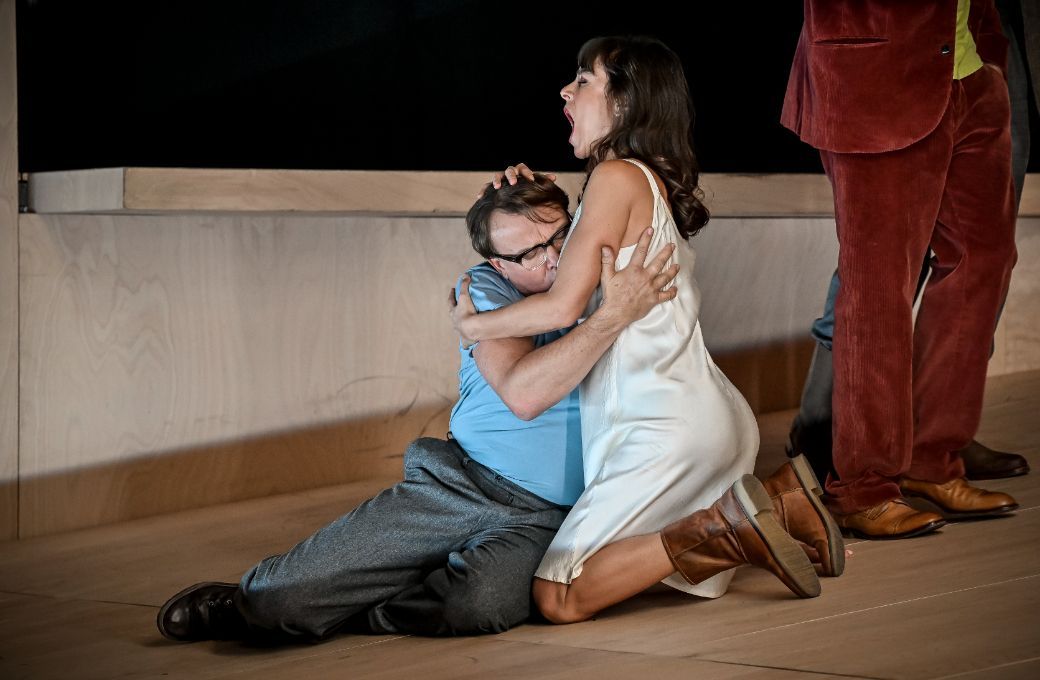In an embarrassment of riches this week at Brno’s Janáček Festival, there was a second chance to hear his 1923 opera Kátya Kabanová. Following Catalan director Calixto Bieito’s emotionally attenuated efforts from Prague’s National Theatre came Tatjana Gürbaca’s staging for the Grand Théâtre de Genève. In each case, the audience is confronted by an empty perspective box as they take their seats, but what happens next couldn’t be more different. Berlin-based Gürbaca transcends the potential sterility of the setting, filling it with characters who, if not wholly “realistic” in their actions, take the audience on a satisfyingly emotional, thought-provoking journey.
Gürbaca often sets the scene with a frozen tableau, as in the entrance of Kátya, her mother-in-law Kabanicha, husband Tichon and foster sister, Varvara. As Kátya’s future lover Boris and his friend Kudrjas converse about the former’s infatuation with the young married woman, we see the group upstage, standing stock still in a miniature perspective box that mimics the main, larger one downstage. From their stance and positioning, we already understand Kabanicha’s toxic control over her son Tichon and by extension, Kátya. Gürbaca has visualized the context in which these characters operate, orientating the audience to the tragic story that is about to unfold.
But this is far from a naturalistic telling of the narrative. When Kátya and Varvara sing of their happy childhood days and the older of the two confesses she has secretly fallen in love with Boris, they dress-up, donning uber-feminine tulle skirts and fanciful hats. As adult young women, their play comes off as exaggerated. We are soon aware that Kátya is quite divorced from reality, and indeed, this is the hallmark of the character for Gürbaca.
American soprano Corinne Winters invested herself fully in this conception. Although she was at the centre of the opera throughout, there was a sense (in the best way) that she was simultaneously entirely apart. For instance, when she and Boris stole away for a clandestine meeting in the garden, singing what is the closest to a “love duet” in this opera, Winters barely looked at her lover, clearly obsessed with the “idea” of a passionate affair. Most of her vocal delivery was straight out to the house ― not old-fashioned “park and bark” but rather, a choice that established Kátya’s disconnectedness. Her suicide scene was choreographed amidst the other characters who obsessively repeated mundane gestures as Kátya frantically ran around holding up a mirror to each, forcing them to recognize the stifling routine from which she must escape.
Winters sang with full-voiced, rich tone throughout. This was full-on, almost verismo Janáček singing. Absolutely secure in her technique, one could only ask for a bit more nuance at times. But that is a quibble ― this was a triumphant traversal of a relentless role and Winters was justly rewarded with huge ovations.
Gürbaca’s characterization of Kabanicha is fascinating, if flawed in execution. Russian mezzo-soprano Elena Zhidkova was dressed and coiffed like a 1960s presidential First Lady à la Lady Bird Johnson. Constantly stroking the bib of her dress, fussing over her son Boris as if he were a six-year-old child, tottering around like mutton dressed as lamb, Zhidkova did her best to embody an older, but still very vital woman. That the singer herself is nowhere near the age she was asked to portray resulted in a lot of cliched “old lady” acting. Vocally, Zhidkova offered voluminous tone, maybe a bit too juicy for a supposed elderly person.
The vocal standout in many ways was Czech tenor Aleš Briscein as Boris. His clean, razor-sharp tone possessed a degree of authenticity often lacking elsewhere. Given how notoriously difficult the language is for non-native speakers, the majority of the cast did nobly well, but a lot of their vocalism sounded almost too grandly “sung” without much syntactic specificity ― a criticism confirmed by a distinguished teacher of the Czech language whose acquaintance I made here.
As mamma’s boy Tichon, Danish tenor Magnus Vigilius was excellent again after his strong Boris in the Prague production of Kátya. Varvara was freshly sung and spunkily characterized by Croatian mezzo Ena Pongrac. Welsh tenor Sam Furness sang her boyfriend, Kudryas, with full, rich tone (Turridu is one of his roles) that only lacked some light and shade.

Czech conductor Tomáš Netopil, deeply immersed as he is in Janáček, inspired in the Orchestre de la Suisse Romande a grand, almost Romantic delivery of the score. There was a richness of tone and elision of the melodic fragments that contrasted sharply with the spikier delivery of Prague’s National Theatre Orchestra last week. But it was all of a piece with Gürbaca’s concept of a Kátya who is quickly disabused of her romantic delusions, leaving only one alternative for escape ― the ultimate one.


